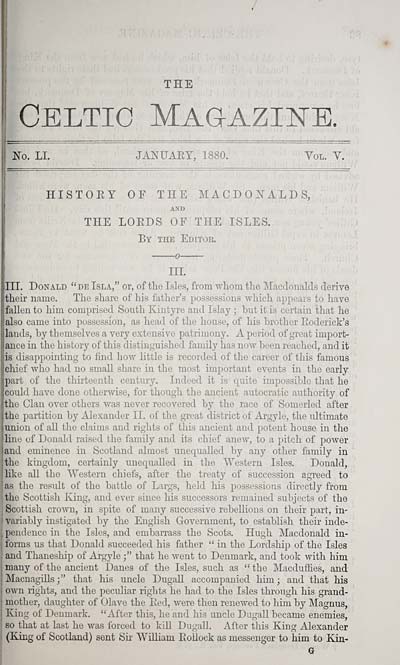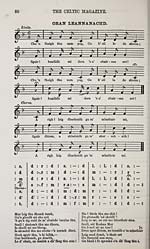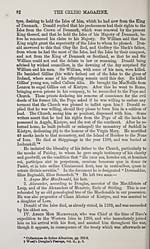Blair Collection > Celtic magazine > Volume 5
(91)
Download files
Complete book:
Individual page:
Thumbnail gallery: Grid view | List view

THE
Celtic Mag-azine.
No. LI. JANUAEY, 1880. Vol. Y.
HISTOEY OF THE MACDOKALDS,
AND
THE LOEDS OF THE ISLES.
By the Editor.
IIL
III. Donald "de Isla," or, of the Isles, from wlioni the Macdonakis derive
their name. The share of his father's possessions which appears to have
fallen to him comprised South Kintyre and Islay ; but it is certain that he
also came into possession, as head of the house, of his brother Eoderick's
lands, by themselves a very extensive patrimony. A period of great import-
ance in the history of this distinguished family has now been reached, and it
is disappointing to find how little is recorded of the career of this famous
chief who had no small share in the most important events in the early
part of the thirteenth century. Indeed it is quite impossible that he
could have done otherwise, for though the ancient autocratic authority of
the Clan over others was never recovered by the race of Somerled after
the partition by Alexander II. of the gTeat district of Argyle, the ultimate
union of aU the claims and rights of this ancient and potent house in the
line of Donald raised the family and its chief anew, to a pitch of power
and eminence in Scotland almost unequalled by any other family in
the kingdom, certainly unecjualled in the Western Isles. Donald,
like all the "Western chiefs, after the treaty of succession agreed to
as the result of the battle of Largs, held his possessions directly from
the Scottish King, and ever since his successors remained subjects of the
Scottish crown, in spite of many successive rebellions on their part, in-
variably instigated by the English Government, to establish their inde-
pendence in the Isles, and embarrass the Scots. Hugh Macdonald in-
forms us that Donald succeeded his father " in the Lordship of the Isles
and Thaneship of Argyle ;" that he went to Denmark, and took with him
many of the ancient Danes of the Isles, such as " the Macduffies, and
Macnagills;" that his uncle DugaU accompanied him; and that his
own rights, and the peculiar rights he had to the Isles through his grand-
mother, daughter of Olave the Eed, were then renewed to him by Magnus,
King of Denmark. "After this, he and his uncle Dugall became enemies,
so that at last he was forced to kiU Dugall. After this King Alexander
(King of Scotland) sent Sir William Eoilock as messenger to him to Kin-
G
Celtic Mag-azine.
No. LI. JANUAEY, 1880. Vol. Y.
HISTOEY OF THE MACDOKALDS,
AND
THE LOEDS OF THE ISLES.
By the Editor.
IIL
III. Donald "de Isla," or, of the Isles, from wlioni the Macdonakis derive
their name. The share of his father's possessions which appears to have
fallen to him comprised South Kintyre and Islay ; but it is certain that he
also came into possession, as head of the house, of his brother Eoderick's
lands, by themselves a very extensive patrimony. A period of great import-
ance in the history of this distinguished family has now been reached, and it
is disappointing to find how little is recorded of the career of this famous
chief who had no small share in the most important events in the early
part of the thirteenth century. Indeed it is quite impossible that he
could have done otherwise, for though the ancient autocratic authority of
the Clan over others was never recovered by the race of Somerled after
the partition by Alexander II. of the gTeat district of Argyle, the ultimate
union of aU the claims and rights of this ancient and potent house in the
line of Donald raised the family and its chief anew, to a pitch of power
and eminence in Scotland almost unequalled by any other family in
the kingdom, certainly unecjualled in the Western Isles. Donald,
like all the "Western chiefs, after the treaty of succession agreed to
as the result of the battle of Largs, held his possessions directly from
the Scottish King, and ever since his successors remained subjects of the
Scottish crown, in spite of many successive rebellions on their part, in-
variably instigated by the English Government, to establish their inde-
pendence in the Isles, and embarrass the Scots. Hugh Macdonald in-
forms us that Donald succeeded his father " in the Lordship of the Isles
and Thaneship of Argyle ;" that he went to Denmark, and took with him
many of the ancient Danes of the Isles, such as " the Macduffies, and
Macnagills;" that his uncle DugaU accompanied him; and that his
own rights, and the peculiar rights he had to the Isles through his grand-
mother, daughter of Olave the Eed, were then renewed to him by Magnus,
King of Denmark. "After this, he and his uncle Dugall became enemies,
so that at last he was forced to kiU Dugall. After this King Alexander
(King of Scotland) sent Sir William Eoilock as messenger to him to Kin-
G
Set display mode to: Large image | Transcription
Images and transcriptions on this page, including medium image downloads, may be used under the Creative Commons Attribution 4.0 International Licence unless otherwise stated. ![]()
| Early Gaelic Book Collections > Blair Collection > Celtic magazine > Volume 5 > (91) |
|---|
| Permanent URL | https://digital.nls.uk/76450053 |
|---|
| Description | Volume V, 1880. |
|---|---|
| Shelfmark | Blair.6 |
| Attribution and copyright: |
|
| Description | A selection of books from a collection of more than 500 titles, mostly on religious and literary topics. Also includes some material dealing with other Celtic languages and societies. Collection created towards the end of the 19th century by Lady Evelyn Stewart Murray. |
|---|
| Description | Selected items from five 'Special and Named Printed Collections'. Includes books in Gaelic and other Celtic languages, works about the Gaels, their languages, literature, culture and history. |
|---|

